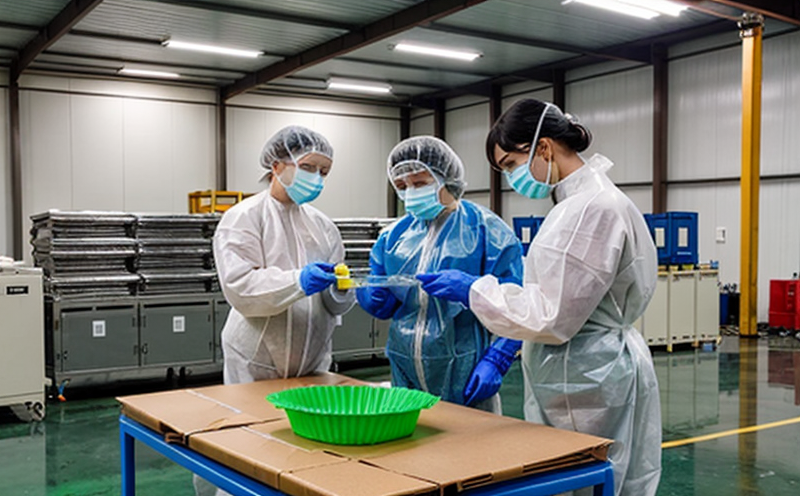ISO 2230-2 Storage Aging Testing
The ISO 2230 series of standards provides a comprehensive framework for evaluating the performance and durability of plastic packaging materials under simulated storage conditions. The second part, ISO 2230-2:2018, specifically focuses on accelerated aging tests intended to mimic long-term storage effects. This service ensures that plastic packaging products maintain their integrity, strength, and functionality over extended periods.
Storage aging is crucial in the plastics industry as it helps manufacturers understand how their materials will perform under real-world conditions before they reach consumers or end-users. Aging can cause physical and chemical changes in polymers, leading to degradation of mechanical properties such as tensile strength, impact resistance, and flexibility.
The process involves exposing samples to controlled environmental conditions that simulate the effects of time, temperature, light, humidity, and other factors typically encountered during storage. This testing method allows for accelerated aging by subjecting materials to higher than normal temperatures or more intense light sources compared to actual field exposure times. The goal is to predict long-term performance based on shorter-term observations.
For accurate results, it is essential that both the test specimens and environmental conditions adhere strictly to specified criteria outlined in ISO 2230-2:2018. Specimens should be prepared according to standard procedures ensuring consistent representation of the intended end-use products. Environmental chambers must maintain precise temperature control within ±1°C for heat aging tests, while UV lamps need to deliver accurate radiation levels.
| Parameter | Specification |
|---|---|
| Temperature (Heat Aging) | 100 ± 1 °C |
| Relative Humidity | 93% ± 2% |
| UV Irradiance (Light Aging) | 500–700 nm, 100 W/m² |
The testing duration varies depending on the specific requirements of the product being evaluated but generally ranges from several days to weeks. During this time, changes in physical and mechanical properties are monitored continuously using appropriate instruments such as tensile testers, impact testers, and flexometers.
Once the test period concludes, detailed reports summarizing all relevant findings are provided along with recommendations for any necessary adjustments to formulations or processing methods aimed at enhancing product stability. These insights can significantly aid in improving product quality while reducing costs associated with premature failure due to aging effects.
Eurolab Advantages
- Accurate and precise testing according to ISO standards
- State-of-the-art facilities equipped for various types of storage aging tests
- Experienced technical staff with deep knowledge in plastic materials science
- Comprehensive reporting capabilities tailored specifically for your needs
We pride ourselves on offering unparalleled accuracy and reliability when it comes to plastic packaging testing services. Our experienced team leverages advanced equipment and techniques to deliver consistent, high-quality results every time. Whether you're seeking basic compliance certification or detailed performance assessments, Eurolab has the expertise needed to meet your requirements.
Customer Impact and Satisfaction
- Enhanced confidence in product quality leading to improved customer satisfaction
- Cost savings through early identification of potential issues during development stages
- Prompt resolution of discrepancies between expected performance and actual outcomes
- Avoidance of costly recalls or returns by ensuring products meet regulatory standards before launch
Our clients benefit from our commitment to excellence in all aspects of testing. By providing reliable data that supports informed decision-making, we help ensure that your plastic packaging meets the highest quality standards consistently across batches and production runs.
Use Cases and Application Examples
| Application | Description |
|---|---|
| Food Contact Packaging | Evaluating the safety and integrity of containers used for storing perishable goods over extended periods. |
| Beverage Bottles | Determining how changes in environmental conditions affect bottle durability and potential leakage rates. |
| Pharmaceutical Containers | Assessing the stability of medicinal compounds stored within flexible containers over prolonged storage periods. |





